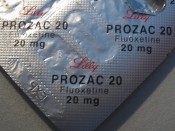Prozac During PregnancyLawsuits are currently being pursued for women who took Prozac during pregnancy and had children born with cardiac and other serious congenital birth defects. These defects have been potentially linked to use of the anti-depressant drug Prozac during pregnancy. Research suggests serious side effects from use of SSRI antidepressants like Prozac (fluoxetine) during pregnancy, including increased risk of congenital heart defects and other congenital birth defects resulting from women taking Prozac during pregnancy. The potential link between Prozac and congenital heart defects has many professionals concerned about pregnant women being prescribed the antidepressant medication Prozac, and taking Prozac during pregnancy. SSRIs like Zoloft, Prozac, Celexa and Paxil have also been linked to increased risk of Persistent Pulmonary Hypertension of the Newborn (PPHN).
What is Prozac?
 Prozac (fluoxetine) is grouped with other antidepressants as a Selective Serotonin Re-uptake Inhibitor (SSRI) which works by raising serotonin levels in the brain, regulating mood, sleep and appetite. Prozac affects chemical levels in the brain which may become unbalanced and create symptoms. Prozac during pregnancy is used to treat depression, bulimia nervosa, obsessive-compulsive disorder (OCD), panic disorder, anxiety disorders, post-traumatic stress disorder (PTSD), and premenstrual dysphoric disorder (PMDD). Researchers from the University of Pittsburgh estimated in May 2005 in the Journal of the American Medical Association, that in any given year at over 80,000 pregnant women in the U.S. are prescribed SSRIs, with Prozac during pregnancy being the number one seller.
Prozac (fluoxetine) is grouped with other antidepressants as a Selective Serotonin Re-uptake Inhibitor (SSRI) which works by raising serotonin levels in the brain, regulating mood, sleep and appetite. Prozac affects chemical levels in the brain which may become unbalanced and create symptoms. Prozac during pregnancy is used to treat depression, bulimia nervosa, obsessive-compulsive disorder (OCD), panic disorder, anxiety disorders, post-traumatic stress disorder (PTSD), and premenstrual dysphoric disorder (PMDD). Researchers from the University of Pittsburgh estimated in May 2005 in the Journal of the American Medical Association, that in any given year at over 80,000 pregnant women in the U.S. are prescribed SSRIs, with Prozac during pregnancy being the number one seller.
Prozac during pregnancy and other SSRIs during pregnancy have been linked to serious side effects, including increased risk of congenital heart defects, Persistent Pulmonary Hypertension of the Newborn (PPHN) and documented serious withdrawal symptoms.
Health Canada advised of potential adverse effects of SSRIs and other anti-depressants on newborns, specifically fluoxetine (Prozac)in 2004. This was intended to increase awareness among mothers and physicians of possible symptoms and side effects occurring in newborns, so that symptoms could be recognized and addressed quickly.
When the Food and Drug Administration (FDA) approved Prozac (fluoxetine) in 1998, it became the most widely prescribed drug for depression on the market. A 1996 study published in the New England Journal of Medicine, two years before the FDA approval, revealed that women taking Prozac during pregnancy were two times as likely to deliver a baby with three or more abnormalities and poorer than average neonatal adaptation.
Prozac Heart Defects
Taking  SSRI antidepressants like Zoloft, Paxil, Celexa, Lexapro and Prozac during pregnancy has been linked to cases of serious congenital heart defects, which may include atrial septal defects (ASD – Hole in Heart), ventricular septal defects (VSD – Hole in the Heart), tetrology of fallot (ToF), hypoplastic left heart syndrome (HLHS), transposition of the great arteries (TGA or TOGA), patent ductus arteriosus (PDA), total anomalous pulmonary venous return (TAPVR), double outlet right ventricle (DORV), and coarctation of the aorta (CoA). With these birth defects, in many cases, surgery is required when a child is an infant or toddler and then again, potentially multiple times, as the child grows to maturity. Many congenital heart defects are treatable when they are diagnosed and addressed early. Children may be able to lead mostly normal and productive lives following medical attention. However, in some cases the only viable option to preserve the child’s life and correct these severe heart defects involves a heart transplant.
SSRI antidepressants like Zoloft, Paxil, Celexa, Lexapro and Prozac during pregnancy has been linked to cases of serious congenital heart defects, which may include atrial septal defects (ASD – Hole in Heart), ventricular septal defects (VSD – Hole in the Heart), tetrology of fallot (ToF), hypoplastic left heart syndrome (HLHS), transposition of the great arteries (TGA or TOGA), patent ductus arteriosus (PDA), total anomalous pulmonary venous return (TAPVR), double outlet right ventricle (DORV), and coarctation of the aorta (CoA). With these birth defects, in many cases, surgery is required when a child is an infant or toddler and then again, potentially multiple times, as the child grows to maturity. Many congenital heart defects are treatable when they are diagnosed and addressed early. Children may be able to lead mostly normal and productive lives following medical attention. However, in some cases the only viable option to preserve the child’s life and correct these severe heart defects involves a heart transplant.
A Danish study in 2005 indicated that pregnant women prescribed SSRI antidepressant medicines like Prozac during pregnancy may have an increased risk of giving birth to infants with congenital heart problems. Based on this study, newborns exposed to SSRI antidepressants like Prozac, Zoloft, Celexa and Paxil during the first 3 months of pregnancy had a 60 percent higher probability of developing congenital heart defects when compared with infants whose pregnant mothers did not take SSRI antidepressants lie Prozac during pregnancy.
In the Diav-Citrin Study it was shown that Prozac during pregnancy increases the risk of Cardiovascular defects four and a half times and doubles the risk of major abnormalities overall. If you or a loved one has suffered from a birth defect that you believe was caused by an SSRI please contact us immediately.
 There is also a strong link between SSRI antidepressants like Prozac during pregnancy and other congenital birth defects and malformations, including lung, cranio-facial, limb (arm, hand, leg, foot) and abdominal wall defects. A study conducted at Aarhus University Hospital, Denmark, revealed that the risk of pregnant women giving birth to babies with congenital birth defects, including heart and other defects, was higher among women who had been prescribed and taken SSRIs such as Prozac during pregnancy and in the month prior to conception, compared with those who had no SSRI prescriptions filled during the same period. The Alwan 2007 study showed an almost three times increased risk of Craniosynostosis, which is when the plates of the skull prematurely fuse. The Alwan study also showed an increased risk associated with SSRI’s as a group, for Anencephaly, Craniosynostosis and Omphalocele.
There is also a strong link between SSRI antidepressants like Prozac during pregnancy and other congenital birth defects and malformations, including lung, cranio-facial, limb (arm, hand, leg, foot) and abdominal wall defects. A study conducted at Aarhus University Hospital, Denmark, revealed that the risk of pregnant women giving birth to babies with congenital birth defects, including heart and other defects, was higher among women who had been prescribed and taken SSRIs such as Prozac during pregnancy and in the month prior to conception, compared with those who had no SSRI prescriptions filled during the same period. The Alwan 2007 study showed an almost three times increased risk of Craniosynostosis, which is when the plates of the skull prematurely fuse. The Alwan study also showed an increased risk associated with SSRI’s as a group, for Anencephaly, Craniosynostosis and Omphalocele.
Women who are taking SSRI antidepressants, including Prozac, who are pregnant or thinking about becoming pregnant should speak with their doctor about the risks associated with taking SSRIs like Prozac during pregnancy. There are risks associated with taking Prozac during pregnancy. There may also be concerns about discontinuing prozac during pregnancy. All Birth Defect risks should be discussed with a physician and balanced against any possible benefits of taking this medication during pregnancy.
Prozac Class Action Lawsuit vs. Individual Prozac Lawsuit
There are distinct differences between a Prozac (fluoxetine) class action lawsuit and a more typical individual Prozac lawsuit. A Prozac class action lawsuit would be a form of Prozac lawsuit in which a large group of people (plaintiffs) collectively bring a lawsuit to court in the form of a “class action” against the manufacturers of Prozac (defendant). In a class action lawsuit involving personal injury resulting from defective products such as antidepressant SSRI drugs like Prozac (fluoxetine), Paxil (paroxetine), Zoloft (sertraline), Lexapro (escitalopram) and Celexa (citalopram), all Prozac lawsuit plaintiffs would typically be grouped together into a single Prozac class action lawsuit, regardless of the degree or severity of their birth defect injuries. In this type of Prozac class action lawsuit, plaintiffs with injuries ranging from minor heart murmurs not requiring surgery, all the way to the most severe congenital heart defects, requiring multiple surgeries or a complete heart transplant, would be grouped into one single Prozac class action lawsuit. All plaintiffs in the class would equally share any award or settlement resulting from the Prozac class action lawsuit.
In Prozac during pregnancy lawsuits involving catastrophic injury or death, an individual lawsuit, in most cases, is more appropriate and in the plaintiff’s best interest. SSRI antidepressants like Prozac, Celexa, Lexapro, Paxil and Zoloft have been linked to severe congenital heart defects, including: atrial septal defects (ASD – hole in the heart), ventricular septal defects (VSD – hole in the heart), tetrology of fallot (ToF), hypoplastic left heart syndrome (HLHS), transposition of the great arteries (TGA or TOGA), patent ductus arteriosus (PDA), total anomalous pulmonary venous return (TAPVR), double outlet right ventricle (DORV), and coarctation of the aorta (CoA). Prozac cases such as these are better suited to an individual Prozac lawsuit because of the severity and degree of injury to the plaintiff. In an individual Prozac Lawsuit, each plaintiff’s case is filed, presented and considered individually, based on its own strength and degree of injury.
In many cases involving SSRI antidepressants like Prozac, Celexa, Lexapro, Paxil and Zoloft and the serious congenital heart defects related to these SSRI antidepressants, surgery is required. Heart surgery will typically be required when a child is an infant or toddler and then again, potentially multiple times, as the child grows to maturity. In many cases, with surgery and medical care, children may be able to lead mostly normal and productive lives. An individual Prozac lawsuit allows each Prozac victim, their injuries and their future needs to be considered on an individual basis when determining damages, awards and settlement amounts, and not as part of a class action lawsuit.
SSRI Lawsuits
- Celexa Lawsuit
- Paxil Lawsuit
- Prozac Lawsuit
- Zoloft Lawsuit
Speak to a Prozac Lawsuit Lawyer about Filing a Prozac Lawsuit
Call and speak to a Prozac During Pregnancy Lawsuit attorney if you took Prozac or generic fluoxetine during pregnancy and your child was born with a birth defect. We encourage you to contact a Prozac lawsuit attorney at our law firm immediately. It may be too late to avoid the debilitating effects of Prozac, but an experienced Prozac lawsuit products liability attorney at the Willis Law Firm can assist you in filing a Prozac lawsuit and taking legal action against the manufacturer of Prozac. You are not alone. Join other birth defect victims and their families in speaking up for and fighting for your legal rights with a Prozac lawsuit.
Please fill out our free online legal evaluation form and we will contact you within 24 hours. Please keep in mind that certain states have statutes of limitation that limit the amount of time you have to file a Prozac lawsuit or seek legal action. Contact our law firm immediately so that we may explain the rights and options available to you and your family in filing a Prozac lawsuit.

